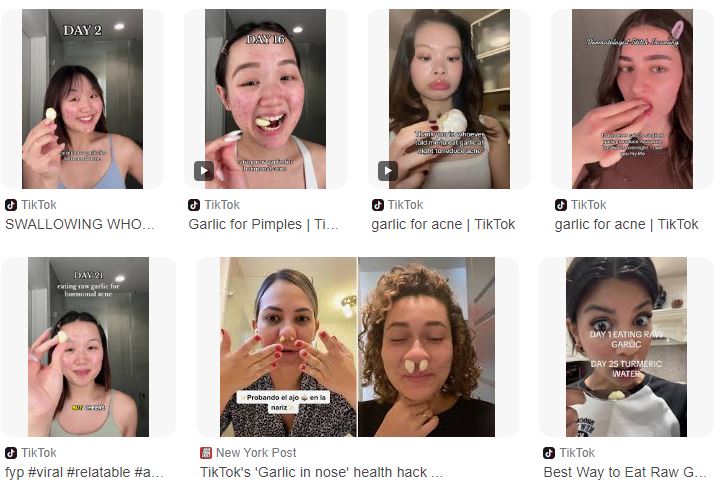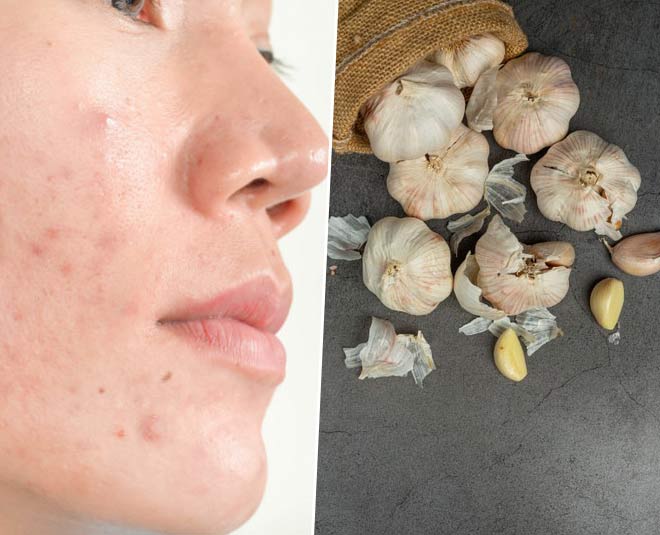A viral TikTok video asserts that ingesting raw garlic cloves can cure acne, a trend spreading across various social media platforms. While the antimicrobial and anti-inflammatory properties of garlic’s bioactive compounds are well-documented, the question remains: can consuming raw garlic effectively prevent acne breakouts, and is it safe? Let’s examine whether there is scientific support for this popular remedy.
Garlic for Acne: Dissecting the Viral TikTok trend
In the past year, there has been a resurgence of interest in using garlic as a remedy for acne. TikTok videos from numerous content creators have praised garlic consumption not only for skin health but also for its potential benefits to gut health. These videos often present anecdotal evidence, showcasing visual proof of improvements in acne severity and occurrence.

Does consuming Garlic aid in treating Acne?
Many individuals experiencing acne are drawn to accessible, natural remedies, and kitchen-based DIY solutions often cycle through periods of popularity. However, it is important to understand the underlying causes of any medical condition to develop safe and effective treatments.
Garlic has been a staple in traditional medicine across various cultures for decades. With over 200 compounds including organosulfur compounds, amino acids, vitamins A, B1, B2, and E, and minerals like zinc, garlic has garnered attention in modern medical research for its potential health benefits. Nevertheless, there is currently no scientific evidence supporting the ingestion of raw garlic as a treatment for acne.
Allicin, the most extensively studied compound in garlic and a potent organosulfur compound, has shown significant antimicrobial effects against various bacteria in laboratory tests. Recent studies have indicated that garlic extract can inhibit the growth of bacteria associated with acne. Moreover, allicin exhibits anti-inflammatory and antioxidant properties that may contribute to reducing acne.
However, research into the antimicrobial effects of garlic has predominantly focused on topical applications. Allicin is formed through the interaction of the enzyme alliinase and alliin when garlic is crushed. It is a relatively unstable compound that is likely metabolized in the stomach after contact with oral mucosa, potentially limiting its full effectiveness when swallowed whole.
Cooking, aging, or drying raw garlic diminishes its allicin content; however, breakdown products like diallyl sulfide (DAS), diallyl disulfide (DADS), and diallyl trisulfide (DATS) retain anti-inflammatory and antioxidant properties. These compounds may increase through cooking and are absorbable in the intestine. Vitamins B, E, and zinc in garlic also contribute to maintaining a healthy skin barrier.
While bioactive compounds in garlic demonstrate antimicrobial, antioxidant, and anti-inflammatory properties that could potentially aid in acne treatment, current research lacks sufficient evidence to substantiate this claim.
Why you should avoid using Garlic for Acne
Clinical evidence does not support the oral consumption of raw garlic for treating acne. Anecdotal evidence on social media suggesting a single clove of garlic lacks substantiation from rigorous studies.
Raw garlic consumption can exacerbate potential side effects, such as bad breath, body odor, allergic reactions, GERD, flatulence, and abdominal pain.
Garlic interferes with blood clotting, posing risks for individuals on blood thinners or with clotting disorders. Excessive garlic intake has been linked to cases of excessive bleeding during surgery.
To manage any adverse effects from garlic consumption, discontinue use and promptly consult a healthcare professional for appropriate management. The recommended daily limit for raw garlic consumption is 1–2 cloves per day to mitigate potential risks.
Expert’s View
Expert opinion on the use of garlic for acne remains cautious due to the lack of scientific studies or official publications supporting its efficacy. While swallowing a garlic clove is generally considered harmless, it is unlikely to have a significant impact on acne. Dermatologists recommend consulting them for personalized acne treatments backed by robust scientific evidence.
RELATED ARTICLE: Study Warns of TikTok Medical Advice: Scroll, Don’t Swallow
An Outlook
The viral trend promoting raw garlic as a cure for acne lacks scientific support despite garlic’s well-documented antimicrobial and anti-inflammatory properties. While garlic has been used in traditional medicine and contains beneficial compounds, current research does not substantiate its effectiveness when ingested orally for treating acne. Moreover, consuming raw garlic may lead to potential side effects and interactions, including issues with blood clotting. Dermatologists advise seeking evidence-based acne treatments tailored to individual needs rather than relying on unverified remedies like raw garlic.
